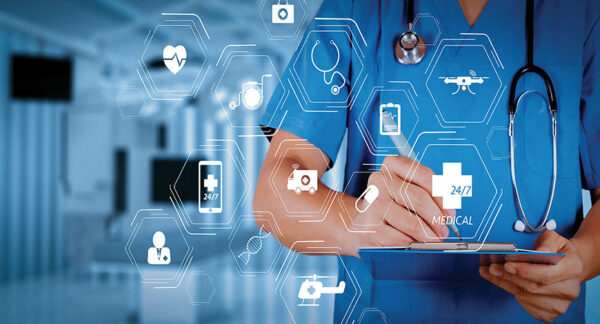The New Era of HealthTech: Revolutionizing Healthcare for a Better Tomorrow
The integration of healthcare and technology, commonly referred to as HealthTech, is transforming the healthcare industry at an unprecedented pace. This intersection is yielding innovative solutions that enhance patient care, optimize healthcare processes, and empower individuals to take proactive control of their health. From advanced wearables to AI-driven diagnostics, HealthTech is creating a future where healthcare is more efficient, accessible, and personalized.
Wearable Health Devices: A New Frontier in Personal Health
Wearable health devices have surged in popularity, providing real-time insights into various aspects of personal health. Devices like fitness trackers, smartwatches, and even smart clothing monitor metrics such as heart rate, sleep quality, physical activity, and more. The data collected offers valuable insights for individuals and can be shared with healthcare providers for comprehensive care.
The Impact of Wearable Health Devices:
- Continuous Health Monitoring: Wearables offer ongoing health tracking, enabling early detection of potential health issues.
- Customized Health Insights: These devices provide personalized data that help users make informed lifestyle choices and manage their health effectively.
- Enhanced Engagement: Wearables motivate users to stay committed to their health goals through real-time feedback and interactive features.
Telemedicine: Expanding Access to Care
Telemedicine has become an essential component of modern healthcare, particularly highlighted by the COVID-19 pandemic. Utilizing digital communication tools, telemedicine enables remote consultations between patients and healthcare providers. This approach enhances accessibility and reduces the strain on healthcare facilities.
Benefits of Telemedicine:
- Improved Accessibility: Patients in remote or underserved regions can access healthcare services without traveling long distances.
- Convenient Consultations: Telemedicine offers flexibility, allowing patients to schedule appointments that suit their schedules.
- Cost Reduction: Virtual consultations help lower healthcare costs by minimizing the need for physical infrastructure and in-person visits.
The Role of Artificial Intelligence in Healthcare:
Artificial Intelligence (AI) is revolutionizing healthcare by improving diagnostic accuracy, predicting disease outbreaks, and personalizing treatment plans. Machine learning algorithms analyze vast datasets to identify patterns and make predictions that inform clinical decisions.
AI Applications in Healthcare:
- Enhanced Diagnostics: AI-powered tools can accurately analyze medical images, such as X-rays and MRIs, aiding in the early detection of diseases like cancer.
- Predictive Analytics: AI can forecast disease outbreaks and patient outcomes by examining historical data, enabling proactive interventions.
- Tailored Treatments: AI assists in developing personalized treatment plans based on an individual’s genetic profile, lifestyle, and medical history.

The Future of HealthTech:
The future of HealthTech is bright, with ongoing advancements poised to further improve healthcare delivery and patient outcomes. Emerging trends include:
- Blockchain for Data Security: Utilizing blockchain technology to secure and protect health data through decentralized and tamper-proof systems.
- Virtual Reality (VR) Therapy: Employing VR for pain management, physical therapy, and mental health treatments.
- Robotics in Surgery: Advanced robotic systems offering greater precision and control during surgical procedures.
Conclusion:
HealthTech is a rapidly evolving field with the potential to transform healthcare dramatically. By merging cutting-edge technology with medical expertise, we are creating a more efficient, accessible, and personalized healthcare system. As innovation continues to drive the industry forward, the ultimate goal remains to improve the quality of life for individuals worldwide. Embracing HealthTech means not only adopting new tools but also rethinking how we approach health and wellness in the digital age.
FAQs:
- What is HealthTech?
HealthTech refers to the integration of technology with healthcare services to enhance the delivery, efficiency, and quality of care. This encompasses a broad range of digital tools, devices, and innovations designed to improve patient outcomes and streamline healthcare processes
- How does HealthTech enhance patient care?
HealthTech enhances patient care through:
- Greater Accessibility: Telehealth platforms enable patients to connect with healthcare providers from any location, minimizing the necessity for travel.
- Tailored Treatments: Leveraging AI and data analytics, HealthTech allows for the development of individualized treatment plans based on specific health data.
- Continuous Monitoring: Wearable devices offer real-time health monitoring, allowing for timely interventions and improved management of chronic illnesses.
- What are wearable health devices?
Wearable health devices are smart gadgets that track various health indicators such as heart rate, activity levels, and sleep patterns. Examples include fitness bands, smartwatches, and smart textiles. These devices provide users with valuable health insights and can share data with healthcare professionals for a more integrated approach to health management.
- How does telemedicine function?
Telemedicine employs digital platforms to enable remote consultations between patients and healthcare providers. Through video calls, phone calls, and online messaging, patients can receive medical advice, diagnoses, and treatment plans from the comfort of their homes. This method enhances healthcare accessibility and convenience, particularly for those in remote areas.
- What is the impact of AI in healthcare?
Artificial Intelligence (AI) impacts healthcare by:
- Improving Diagnostics: AI algorithms analyze medical images and data, leading to more accurate and earlier disease detection.
- Predicting Trends: AI can foresee disease outbreaks and patient outcomes by analyzing historical data, allowing for timely interventions.
- Customizing Care: AI assists in developing personalized treatment plans tailored to an individual’s genetic profile, lifestyle, and medical history.
- How secure are HealthTech solutions?
HealthTech solutions generally incorporate robust security measures, including encryption and data protection protocols, to ensure patient privacy and data integrity. The adoption of blockchain technology is being explored to enhance the security of health data through decentralized, tamper-proof systems. Nonetheless, maintaining vigilance and adhering to cybersecurity best practices is essential for both providers and users.
- Can telemedicine completely replace in-person visits?
Telemedicine complements rather than completely replaces in-person visits. While it offers significant advantages for routine consultations and follow-ups, certain medical conditions and procedures necessitate physical examinations and direct interaction with healthcare providers. Therefore, telemedicine is best used in conjunction with traditional in-person care.
- How does AI enhance diagnostic precision?
AI enhances diagnostic precision by processing large volumes of medical data and identifying patterns that might be overlooked by human clinicians. For instance, AI tools can analyze medical images such as X-rays and MRIs with high accuracy, facilitating the early and precise detection of diseases like cancer.
- What future trends are anticipated in HealthTech?
Anticipated future trends in HealthTech include:
- Blockchain for Enhanced Security: Using blockchain technology to secure and safeguard health data.
- Virtual Reality (VR) in Therapy: Implementing VR for therapeutic purposes, including pain management and mental health treatments.
- Advanced Robotic Surgery: Developing robotic systems that offer greater precision and efficiency in surgical procedures.
- How do wearable devices encourage healthier lifestyles?
Wearable devices encourage healthier lifestyles by providing real-time feedback on various health metrics, helping users set and achieve health goals. These devices often include features such as activity tracking, goal setting, and reminders, motivating users to stay active and adopt healthier habits. Additionally, gamification elements like earning rewards and participating in challenges further engage and inspire users to maintain a healthy lifestyle.




